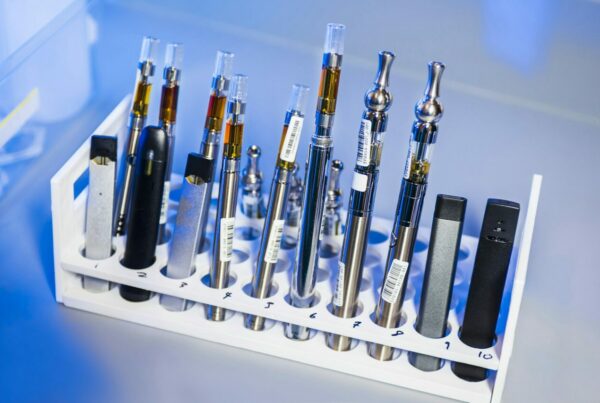N, N-Dimethyltryptamine (DMT) is a substance commonly found in a variety of plants and animals, known for its potent yet short-lived psychedelic properties when ingested.
Emerging evidence indicates that DMT, which naturally occurs in the body, plays important roles in the peripheral and central nervous systems and might serve as a neurotransmitter.
DMT can trigger strong psychedelic experiences, however, it typically does not cause many negative effects, except for potential cardiovascular problems when administered in high doses via injection.
We invite you to explore DMT and its diverse roles, which range from recreational use to its intriguing potential in scientific studies and therapeutic uses.

DMT: A Brief Introduction
| Aspect | Details |
| Name | N, N-Dimethyltryptamine (DMT) |
| Classification | Indole alkaloid |
| Occurrence | Occurs naturally in a variety of plants and animals |
| Psychoactive Effects | Induces short yet intense psychedelic experiences upon consumption. |
| Method of Consumption | Can be smoked, injected, or consumed orally. |
| Duration of Effects | Effects are typically brief, lasting from 5 to 30 minutes. |
| Chemical Structure | Comprises of a tryptamine core with two methyl groups attached to the amine nitrogen atom. |
| Metabolism | Rapidly metabolized by the body, broken down by monoamine oxidase (MAO). |
| Cultural Use | Historically used in various ceremonial and shamanic rituals by indigenous cultures. |
| Other names | Dimitrifantasiabusinessman’s tripBusinessman’s special45-minute psychosisspiritual molecule |
DMT’s Role in Mental Health
N, N-Dimethyltryptamine (DMT), a compound famous for its potent psychedelic effects, is garnering attention for its potential benefits to mental health. Apart from its conventional reputation of inducing intense visionary experiences, recent research suggests a connection between DMT and mental wellness.
Effects on Psychological and Emotional Well-being
DMT, known for its psychedelic effects, can trigger deep emotional responses and significantly alter states of consciousness. Such powerful effects could potentially offer therapeutic strategies to address mental health problems, aid in emotional processing, and shed new light on personal traumas.
Neuroplasticity and Brain Function
Research suggests that DMT might influence neuroplasticity, thereby enhancing the brain’s ability to adapt and reorganize. Investigating its impact on synaptic plasticity and neural connectivity may yield potential treatment options for conditions associated with neural dysregulation.
Potential Therapeutic Application for Mental Health Disorders
Early research emphasizes the potential of DMT in treating mental health disorders such as depression, addiction, and PTSD. Its ability to provoke mystical or spiritual experiences might offer a unique approach to psychotherapy and help in restructuring negative thought processes.
Analyses of the natural presence of DMT within the body underscore its role in mental health resilience, response to stress, and overall psychological well-being. Understanding how the body controls internal DMT levels could lead to novel therapeutic strategies.
DMT and Mental Health Disorders
| Mental Health Disorder | Description | DMT’s Efficacy | Benefits |
| Depression | A mood disorder marked by persistent sadness, a lack of interest, and reduced motivation. | Preliminary research suggests DMT might help relieve symptoms by provoking deeply emotional experiences. | Its rapid onset and ability to evoke transformative experiences could provide new and innovative therapeutic means for reshaping negative thought patterns and enhancing emotional processing. |
| Post-Traumatic Stress Disorder (PTSD) | A mental health disorder triggered by traumatic events, leading to flashbacks, severe anxiety, and intrusive thoughts. | Initial research points to DMT’s potential in managing symptoms by provoking spiritual or mystical experiences that could help patients reframe traumatic memories. | DMT’s potential to induce altered states of consciousness may assist in facilitating emotional processing and offering a fresh perspective on traumatic experiences. |
| Addiction | A complex disorder characterized by compulsive engagement in rewarding stimuli, despite adverse consequences. | Certain studies suggest DMT’s role in disrupting addictive patterns and reducing substance cravings. | The capacity of DMT to provoke intense and transformative experiences could help individuals alter their behavioural patterns and confront their issues with addiction. |
Approach to Using DMT
DMT, a substance renowned for triggering short but intense psychedelic experiences, can be administered in numerous ways. The choice of administration method often hinges on the desired intensity and duration of the effect.
Smoking:
DMT, when ignited in a pipe or vaporized, necessitates careful temperature control to avoid overheating and burning the compound. The psychedelic experience induced by smoking DMT is almost immediate and typically lasts between 5 to 15 minutes.
Oral Intake:
Taking DMT orally leads to a slower onset of effects but these effects tend to last significantly longer, often several hours. This is due to the slower metabolism of DMT when combined with an MAOI.
Injection:
Injecting DMT directly into the bloodstream yields quick and intense effects.
This method triggers an immediate and intense experience, but it requires precise dosage measurement and carries higher risks.
Insufflation (Snorting):
Snorting DMT results in a slower onset of effects compared to smoking, but can potentially provide a longer-lasting experience.
Sublingual or Buccal Administration:
When DMT is absorbed through the oral mucosa, this method serves as an alternative to smoking and delivers a longer, albeit less intense, experience.
Determining Therapeutic Dosage: N, N-Dimethyltryptamine (DMT)
For smoking, the proposed dosage is between 20 to 40 mg, while for intravenous use, the suggested dosage is 0.2 to 0.4 mg per kg of body weight. These dosage recommendations primarily apply to clinical research, especially in the context of intravenous use.
- Higher doses administered intravenously are associated with intense visuals, temporary loss of control, and a combined state of anxiety and euphoria
- Interestingly, lower doses seem to produce less desirable effects
- Recreational doses of smoked DMT generally range from 40 to 50 mg, sometimes even reaching up to 100 mg
- Different doses of intravenous People who have experienced near-death situations through the use of DMT (7, 14, 18, and 20 mg solutions) have reported significant and enduring enhancements in their psychological health.
Availability of DMT
ProductsOsmosis – 4-ACO-DMT Ethereal Essence Tincture
This tincture, advertised to contain 4-Acetoxy-N, N-dimethyltryptamine (4-AcO-DMT), a variant of DMT, is a liquid extract intended for oral use. It might offer a distinct experience compared to standard DMT.
Lucid Supply Co. – 5-MeO DMT Vaporizer
Offering 5-Methoxy-N, N-dimethyltryptamine (5-MeO-DMT), this vaporizer is known for delivering potent, transformative, and often brief experiences, courtesy of the active ingredient 5-MeO-DMT.
Integral Alchemist – Acacia – 1ml DMT Vape Cartridge
The Integral Alchemist’s DMT vape cartridge is pre-filled with N, N-Dimethyltryptamine and is aimed at those who favor a discreet and convenient method of DMT intake.
Deadhead Chemist – 5-Meo-DMT Cartridge
This cartridge contains 5-Methoxy-N, N-dimethyltryptamine (5-MeO-DMT), a compound renowned for its deep and intense effects.
Potential mental health benefits may be tied to personal growth, spiritual experiences, or therapeutic applications aimed at enhancing emotional well-being.
Deadhead Chemist – N, N DMT Cartridge
Another offering from Deadhead Chemist, this cartridge comes loaded with the traditional N, N-Dimethyltryptamine. Cartridges provide a simple method of DMT intake, enabling a more consistent and balanced experience.
Concluding Remarks
The application of N, N-Dimethyltryptamine (DMT) in
How to find reliable sources for DMT products?
If you’re considering experimenting with DMT products, it’s essential to do so responsibly. Reliable vendors such as Magic Mushrooms Quebec Canada Online Dispensary can provide guidance and a variety of product options.
Frequently Asked Questions:
How do different DMT products affect mental health?
For instance, vaporizers might create immediate effects, while tinctures or vape cartridges could provide more controlled and consistent dosage.
Compounds derived from DMT or 5-MeO-DMT can result in varying intensity levels and distinct mental health effects.
These slight differences underscore the importance of selecting a DMT product that aligns with your personal preferences and mental health goals.
Can DMT lead to lasting improvements in mental health and personal growth?
Evidence, although anecdotal, suggests that DMT-induced experiences could have enduring effects on mental health and personal development.
Experiences with significant impact or transformation, such as near-death-like experiences, are frequently associated with reports of sustained positive changes in psychological health and personal evolution.
Despite being intense and brief, these experiences often set the stage for self-examination, spiritual revelations, and a sense of unity or enlightenment.
After undergoing such experiences, individuals frequently report a refreshed perspective on life, improved emotional resilience, and an enhanced appreciation for existence.
What’s the best way to use DMT for mental health?
It’s vital to make well-informed decisions, which includes extensive research and understanding the compound’s effects.
Advice from mental health professionals or experienced users can provide valuable information on potential risks and advantages.
Assessing personal tolerance and mental preparedness is also crucial, along with creating a supportive and safe environment for the experience.
DMT’s impacts, timeframe, and intensity vary significantly from other psychedelics like psilocybin or LSD. It is particularly noted for its brief duration.
Its unique trait as a high-intensity, short-acting psychedelic requires specific therapeutic strategies in mental health, separate from those utilized with longer-lasting psychedelics.
Recommended Additional Reading:

 Click here for more information about DMT in mental health treatment
Click here for more information about DMT in mental health treatment



